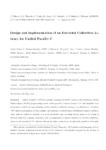Mostrar o rexistro simple do ítem
Design and Implementation of an extended collectives library for unified Parallel C
| dc.contributor.author | Teijeiro Barjas, Carlos | |
| dc.contributor.author | Taboada, Guillermo L. | |
| dc.contributor.author | Touriño, Juan | |
| dc.contributor.author | Doallo, Ramón | |
| dc.contributor.author | Mouriño, José C. | |
| dc.contributor.author | Mallón, Damián A. | |
| dc.contributor.author | Wibecan, Brian | |
| dc.date.accessioned | 2018-11-07T15:45:18Z | |
| dc.date.available | 2018-11-07T15:45:18Z | |
| dc.date.issued | 2013 | |
| dc.identifier.citation | Teijeiro, C., Taboada, G.L., Touriño, J. et al. J. Comput. Sci. Technol. (2013) 28: 72. https://doi.org/10.1007/s11390-013-1313-9 | es_ES |
| dc.identifier.issn | 1000-9000 | |
| dc.identifier.issn | 1860-4749 | |
| dc.identifier.uri | http://hdl.handle.net/2183/21247 | |
| dc.description | This is a post-peer-review, pre-copyedit version of an article published in Journal of Computer Science and Technology. The final authenticated version is available online at: https://doi.org/10.1007/s11390-013-1313-9 | es_ES |
| dc.description.abstract | [Abstract] Unified Parallel C (UPC) is a parallel extension of ANSI C based on the Partitioned Global Address Space (PGAS) programming model, which provides a shared memory view that simplifies code development while it can take advantage of the scalability of distributed memory architectures. Therefore, UPC allows programmers to write parallel applications on hybrid shared/distributed memory architectures, such as multi-core clusters, in a more productive way, accessing remote memory by means of different high-level language constructs, such as assignments to shared variables or collective primitives. However, the standard UPC collectives library includes a reduced set of eight basic primitives with quite limited functionality. This work presents the design and implementation of extended UPC collective functions that overcome the limitations of the standard collectives library, allowing, for example, the use of a specific source and destination thread or defining the amount of data transferred by each particular thread. This library fulfills the demands made by the UPC developers community and implements portable algorithms, independent of the specific UPC compiler/runtime being used. The use of a representative set of these extended collectives has been evaluated using two applications and four kernels as case studies. The results obtained confirm the suitability of the new library to provide easier programming without trading off performance, thus achieving high productivity in parallel programming to harness the performance of hybrid shared/distributed memory architectures in high performance computing. | es_ES |
| dc.description.sponsorship | Ministerio de Ciencia e Innovación; TIN2010-16735 | es_ES |
| dc.description.sponsorship | Xunta de Galcia; 2010/6 | es_ES |
| dc.language.iso | eng | es_ES |
| dc.publisher | Springer New York LLC | es_ES |
| dc.relation.uri | https://doi.org/10.1007/s11390-013-1313-9 | es_ES |
| dc.subject | Unified Parallel C | es_ES |
| dc.subject | Collective operation | es_ES |
| dc.subject | Programmability | es_ES |
| dc.subject | Partitioned global address space | es_ES |
| dc.subject | High performance computing | es_ES |
| dc.title | Design and Implementation of an extended collectives library for unified Parallel C | es_ES |
| dc.type | info:eu-repo/semantics/article | es_ES |
| dc.rights.access | info:eu-repo/semantics/openAccess | es_ES |
| UDC.journalTitle | Journal of Computer Science and Technology | es_ES |
| UDC.volume | 28 | es_ES |
| UDC.issue | 1 | es_ES |
| UDC.startPage | 78 | es_ES |
| UDC.endPage | 89 | es_ES |
| dc.identifier.doi | 10.1007/s11390-013-1313-9 |
Ficheiros no ítem
Este ítem aparece na(s) seguinte(s) colección(s)
-
GI-GAC - Artigos [180]






